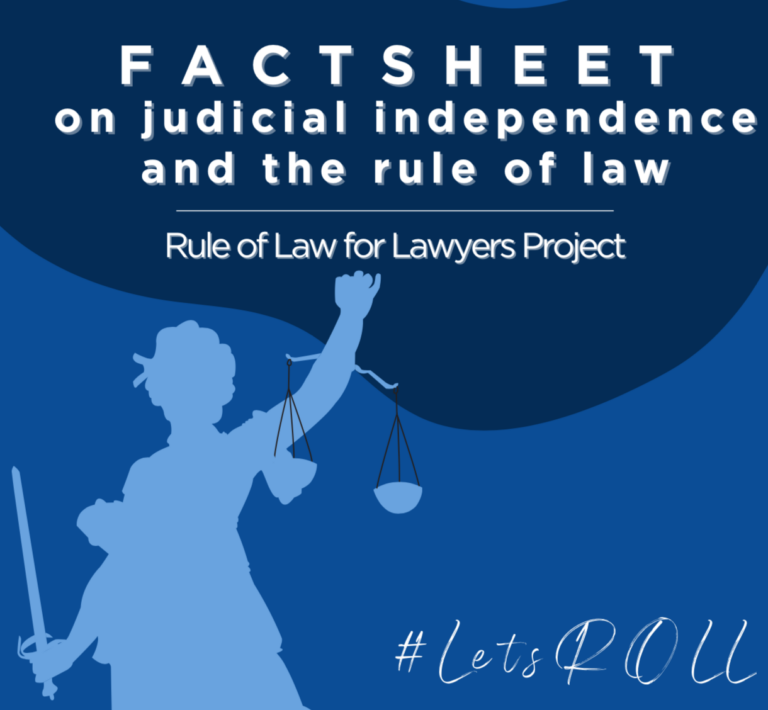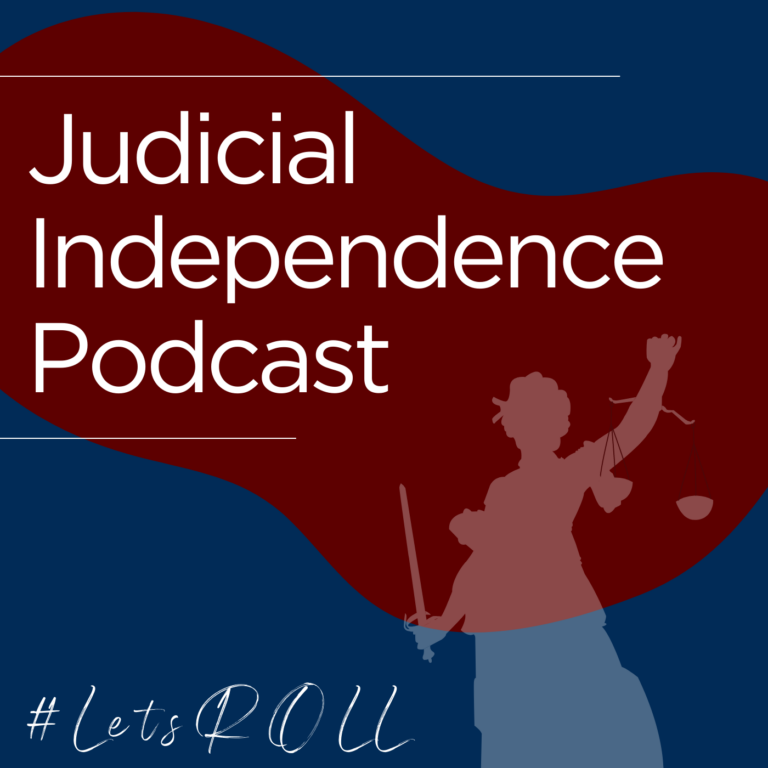The rule of law is the foundation of a well-functioning democracy. In recent years, we have seen increasing pressure on democratic institutions in Central Europe, especially on judicial and investigative bodies. The independence of the judiciary is critically important, and the events in Poland and Hungary show us that it cannot be taken for granted.
In 2023, together with partners from Belgium, Poland, and Malta, we launched an international project called “Rule of Law in Europe for Lawyers (ROLL).” The aim of the project is to raise awareness among attorneys, lawyers and other experts about international standards in the area of judicial independence and to prepare them for possible litigation of cases that could threaten an independent judiciary. Together with partners, we will prepare a background study and organise a series of workshops for lawyers and attorneys. Another aim of the project is to raise awareness within the professional community about the importance of the rule of law, in the form of information materials and podcasts.
The main topics the project deals with are:
- Institutional independence of the judiciary and autonomy of the prosecution service, including governance structures and procedures
- Appointment procedures for the judiciary and prosecution
- Disciplinary procedures and accountability of judges and prosecutors
- Judicial ethics and accountability
- Freedom of expression of judges
Our project partners are:
- International Commission of Jurists (Belgium)
- Aditus (Malta)
- Wolne sądy (Poland)
In the project, we closely cooperate with Helen Duffy from Human Rights in Practice. The project is supported by the Romanian National human rights institution.
FORUM is responsible for the project activities in the Czech Republic and Slovakia.
Download the complete project description:
WHAT’S NEW IN THE PROJECT
LITIGATION WORKSHOPS
- Brussels on 13-14 June 2023: Institutional independence of the judiciary and autonomy of the prosecution service, including governance structures and procedures
- Malta on 16-17 November 2023: Appointment procedures for the judiciary and prosecution and freedom of expression of judges
- Prague on 21-22 March 2024: Disciplinary procedures and accountability of judges and prosecutors and judicial ethics and accountability
To apply for workshops, fill in the registration form.
Programme of the March workshop in Prague here.
FACTSHEET ON JUDICIAL INDEPENDENCE AND THE RULE OF LAW

PODCASTS
The ICJ launched the Judicial Independence Podcast on Spotify. The podcast series looks into the current challenges to the rule of law, particularly to the independence of the judiciary in Europe. Throughout the course of 10 episodes of this podcast, we will speak with experts to shed light on some of these issues and will explore ways to protect and preserve judicial independence, so that human rights across the EU can be effectively protected.
Listen to the podcast here.

- PODCAST 1: In Episode 1, Karolína Babická, Legal Adviser of the ICJ, interviews Róisín Pillay, Director of the Europe and Central Asia programme of the ICJ, on the Rule of Law and judicial independence in the EU, discussing the main problems the EU Member States encounter in recent years, responses by the EU, and what role strategic litigation and international courts can play.
- PODCAST 2: In Episode 2, Karolína Babická, Legal Adviser of the ICJ, interviews the expert Michał Wawrykiewicz, who is a Polish lawyer, specialising in human rights and EU law and the co-founder of the Free Courts Initiative. Their discussion puts under the microscope the rule of law situation in Poland, where judicial reforms have seriously endangered the independence of the judiciary since many years ago and a number of successful litigation took place with cases before the European Court for Human Rights and the Court of Justice of the EU.
- PODCAST 3: In Episode 3, the focus is on the EU level and the currently ongoing Article 7 proceedings against Hungary and Poland. Karolína Babická, Legal Adviser of the International Commission of Jurists, interviews the expert Natacha Kazatchkine, Senior Policy Analyst in Open Society Foundations.
- PODCAST 4: In Episode 4, we focus on the landmark Garzon v. Spain decision of the UN Human Rights Committee. Helen Duffy (Human Rights in Practice) speaks about the case she brought to the Committee, the Spanish refusal to implement the decision, the significance of these developments, and the challenges and importance of strategic litigation on judicial independence more broadly.
- PODCAST 5: In Episode 5, Karolina Babická, Legal Advisor of the ICJ, interviews Gábor Hacsi, Legal Officer and Rule of Law Expert at Amnesty International Hungary. We focus on the case of Hungary, where the rule of law has been systematically undermined for many years, including judicial independence.
- PODCAST 6: In Episode 6, Karolina Babická, Legal Advisor of the ICJ, interviews Radmila Dragicevic-Dicic, a Supreme Court Judge in Serbia and ICJ Commissioner, on the freedom of association and expression of judges. As one of the founders of the Association of Judges in Serbia in 1997 and as a Supreme Court Judge, Radmila discusses her experience with the freedom of association and expression of the judges under the Slobodan Milosevic regime and in the years after in Serbia and across the world.
- PODCAST 7: Episode 7 summarises the main discussions among lawyers with Carlos Ayala, ICJ Vice-President and former Inter-American Commission on Human Rights member, on the right of judges to independence in the Inter-American system. Carlos Ayala shares his expertise regarding the Inter-American Court case law on judicial independence, the implementation of decisions in the Inter-American human rights system, and the need for further dialogue among human rights courts globally.
- PODCAST 8: In Episode 8, Karolína Babická, Senior Legal Adviser of the ICJ interviews Peter Čuroš, a Slovak lawyer currently working with Via Iuris, a nonprofit organization dedicated to promoting justice and the rule of law in Slovakia. Their discussion spotlights the current situation in Slovakia, where judicial system has undergone significant scrutiny and reform over recent years. Peter Čuroš provides his expertise on the impact of the 2020 reforms on judicial independence in Slovakia, contrasting with the political attacks on judicial independence that has occurred since the new administration took office in October 2023.
- Episode 9: is focusing on Bulgaria, an EU Member state that has over the years been facing challenges regarding the rule of law and judicial independence. Karolína Babická interviews an expert from Bulgaria, Adela Katchaounova, attorney-at-law, Co-chair and Legal Defense Programme Director of the Bulgarian Helsinki Committee. The issues discussed in this episode include the constitutional reforms aimed at enhancing judicial independence and limiting the Prosecutor General’s powers, the expired terms of office of the Supreme Judicial Council and of the President of the Supreme Administrative Court, and the landmark judgment Todorova v. Bulgaria of the European Court of Human Rights.
The Rule of Law in Europe for Lawyers (ROLL) project is financially supported by the European Commission, Citizens, Equality, Rights and Values Programme (CERV), under project No. 101084783.
Views and opinions expressed are however those of the author(s) only and do not necessarily reflect those of the European Union. Neither the European Union nor the granting authority can be held responsible for them.

